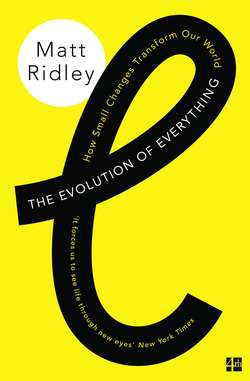Читать книгу The Evolution of Everything: How Small Changes Transform Our World - Matt Ridley, Matt Ridley - Страница 28
Culture-driven genetic evolution
ОглавлениеIn fact, there is a way for acquired characteristics to come to be incorporated into genetic inheritance, but it takes many generations and it is blindly Darwinian. It goes by the name of the Baldwin effect. A species that over many generations repeatedly exposes itself to some experience will eventually find its offspring selected for a genetic predisposition to cope with that experience. Why? Because the offspring that by chance happen to start with a predisposition to cope with that circumstance will survive better than others. The genes can thereby come to embody the experience of the past. Something that was once learned can become an instinct.
A similar though not identical phenomenon is illustrated by the ability to digest lactose sugar in milk, which many people with ancestors from western Europe and eastern Africa possess. Few adult mammals can digest lactose, since milk is not generally drunk after infancy. In two parts of the world, however, human beings evolved the capacity to retain lactose digestion into adulthood by not switching off genes for lactase enzymes. These happened to be the two regions where the domestication of cattle for milk production was first invented. What a happy coincidence! Because people could digest lactose, they were able to invent dairy farming? Well no, the genetic switch plainly happened as a consequence, not a cause, of the invention of dairy farming. But it still had to happen through random mutation followed by non-random survival. Those born by chance with the mutation that caused persistence of lactose digestion tended to be stronger and healthier than their siblings and rivals who could digest less of the goodness in milk. So they thrived, and the gene for lactose digestion spread rapidly. On closer inspection, this incorporation of ancestral experience into the genes is all crane and no skyhook.
So incredible is the complexity of the living world, so counterintuitive is the idea of boot-strapped, spontaneous intricacy, that even the most convinced Darwinian must, in the lonely hours of the night, have moments of doubt. Like Screwtape the devil whispering in the ear of a believer, the ‘argument from personal incredulity’ (as Richard Dawkins calls it) can be very tempting, even if you remind yourself that it’s a massive non sequitur to find divinity in ignorance.
